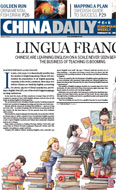Society
For the love of learning
Updated: 2011-02-22 07:54
By Liu Xiangrui (China Daily)
|
 Xu Jixin sorts books at the Loving Library that he founded in 1999. Liu Xiangrui / China Daily |
The nation's first private library continues to battle the odds to survive even as other similar ventures have already closed shop. Liu Xiangrui reports.
More than a decade down the road and 200,000 yuan poorer, Xu Jixin, 43, has a simple piece of advice for anyone wanting to follow in his footsteps: "Don't attempt this." His is a familiar story of the struggles of the more than 300 private libraries set up in China's rural or suburban areas in the past decade, most of which have closed down. It was in 1999 that Xu rented a piece of land by the main road of his Daxinfeng village, located 40 kilometers north of downtown Beijing, to set up his library - the nation's first private library - of three little rooms.
Today, there are signboards outside to suggest there are some 80,000 books housed in the 45-square-meter area. Two of the three rooms stocked with books even double as living areas.
In the outer room, a dozen carefully mounted honorary certificates sit on two big shelves, in contrast to the dust-covered books below.
"The shelf on the right is dedicated to An Zhou, a retired railway employee who donated his lifelong collection to me after learning about my library in the newspaper," Xu says.
The other big shelf has some books on natural history, besides some reference books.
The middle room, which also serves as Xu's office, has several old computers besides two shelves of books, but the majority of his books are shrouded in darkness in the inner room.
While a third of the books have been donated and some are from the early collection of Xu and his teacher father, the others have all been purchased by Xu over the years.
Pointing out that his readers are mostly the villagers and migrant workers living nearby, he says he started his library to give villagers something else to do besides playing mahjong and cards.
"In the beginning, I would receive about a hundred readers a day, but now hardly anyone stops by."
One reason for this can be gleaned from the remarks of a villager surnamed Feng, who works as a mechanic.
"I don't read novels and prefer books on aquaculture, poultry and mechanics," he says.
 |
"But most of the books here are too old and don't suit villagers' tastes," he says, referring to the many texts on Marxist theories.
"But it's unrealistic to expect me to replenish my library with new books, newspapers and magazines," Xu says.
Holding a college degree in finance and accounting, Xu once worked in a factory. He lost his steady income when the factory went bankrupt in 2004, forcing him to rent out the three rooms he had added to his library.
"My library hasn't hosted any activities since a picture exhibition for its 10th anniversary, which cost 6,000 yuan ($900)," Xu says.
To build his collection, Xu would comb the recycling centers for readable second-hand books whenever he had spare cash.
He recalls how he once walked for fours hours to return home with 30 kilograms of books on his bicycle, when it broke down.
All the books in his library are cataloged and arranged scientifically and Xu says he taught himself about library management from scratch.
"It is far more complicated than I thought," he says.
But he is determined to continue.
"I'm a loyal reader of my own library, and it gives me the greatest satisfaction to serve the readers coming in," Xu says. "I also feel responsible to those who donated their books and do not want to see them go to waste."
He plans to reclaim the rooms he rented out when he's less burdened financially after his daughter's graduation from a vocational school, so that he can exhibit the folk relics he has been collecting for years.
"I think young people can learn much about their past through them," he says, pointing to an assortment of stone, bronze and chinaware, besides ancient landowning contracts, adorning the shelves, desks and walls of his library.
He hopes to rope in a State-owned library to introduce a computerized book management system besides setting up an e-reading room.
Professor Wang Zizhou of Peking University, who has been studying private libraries like Xu's, says, "Many of them are small-scale, informal operations with simple facilities and a limited number of books."
But he firmly believes private libraries play an important role in the rural areas and suggests they reinvent themselves as community centers to enjoy a fair chance of survival.
E-paper

Lingua franca
Chinese are learning English on a scale never seen before and the business of teaching is booming.
Golden run ahead
Looking abroad
Mapping out a plan
Specials

Sentimental journey
Prince William and Kate Middleton returned to the place where they met and fell in love.

Rent your own island
Zhejiang Province charts plans to lease coastal islands for private investments

Self-made aircraft
An automobile mechanic in Northeast China made a test flight of his self-made aircraft which cost about US$395.
